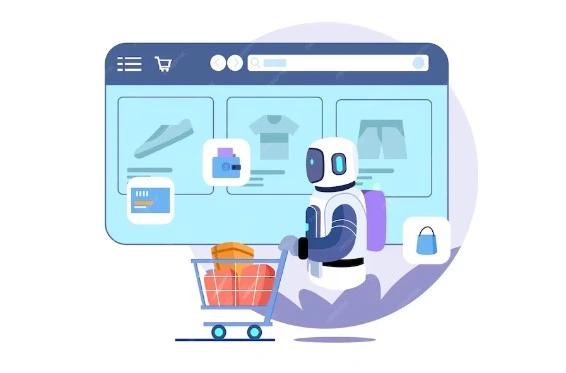Optimize E-Commerce Sales: Integrating ChatGPT into Your Online Store
Recently updated: May 29th, 2024
The advent of AI systems like ChatGPT is revolutionizing businesses across industries, providing new opportunities to optimize operations, engage customers, and boost profits. For e-commerce companies, integrating conversational AI into online stores presents a major avenue for improving sales and creating better shopping experiences. Though ChatGPT is still in its early stages, it clearly demonstrates the tremendous potential of AI to transform the e-commerce space.
In this blog, we will explore how e-commerce businesses can leverage ChatGPT and similar AI tools to optimize various aspects of their platforms. From elevating customer service to generating high-converting product copy, ChatGPT’s natural language capabilities make it a versatile solution for maximizing online sales. Whether you are an online store owner looking to stay ahead of the curve or an e-commerce professional future-proofing your skill set, this blog will illuminate how ChatGPT can become an invaluable asset for your business.
The Rise of ChatGPT and AI for E-Commerce:
ChatGPT is leading the integration of conversational AI into the e-commerce landscape. With powerful natural language capabilities, ChatGPT can provide a multitude of benefits for online businesses looking to optimize operations, boost sales, and improve customer engagement. Let’s explore the capabilities and applications of this transformative technology.
Brief background on ChatGPT and its capabilities
ChatGPT was launched in November 2022 by OpenAI as a conversational AI system powered by generative pre-training. It utilizes a complex machine-learning technique called transformer networks to analyze and understand natural language prompts. Key capabilities include:
- Natural language processing to comprehend nuances in text
- Accessing massive datasets to provide accurate and relevant responses
- Generating coherent, high-quality text tailored to prompts
- Conversing contextually while maintaining logical consistency
Benefits of AI like ChatGPT for e-commerce businesses
With its advanced natural language capabilities, ChatGPT can provide e-commerce businesses with a wide range of benefits to enhance operations, marketing, and the customer experience. Specifically, integrating conversational AI like ChatGPT enables online retailers to:
- Personalized engagement – Chatbots can provide tailored recommendations and conversations by processing customer data. This creates a customized shopping experience.
- 24/7 customer support – The AI can instantly answer product queries without frustration, improving customer satisfaction.
- Appealing content generation – ChatGPT can create SEO-optimized product descriptions, email copy, and other text in a brand’s voice.
- Data analysis – By processing sales data, ChatGPT can identify trends, opportunities, and generate reports to inform business decisions.
Current applications and use cases in e-commerce
While still in its early stages, ChatGPT is already being utilized in various real-world e-commerce applications to optimize different parts of online retail operations and strategy. Some of the key ways businesses are currently implementing conversational AI include:
- Automated customer service agents – instant query resolution and product recommendations
- Dynamic pricing – adjusting prices based on demand and other factors
- Inventory management – using data to optimize stock levels
- On-site search – improving search results and recommendations
- Marketing copy – generating optimized product listings and campaign content
As the technology progresses, ChatGPT and AI will enable even more impactful applications to transform e-commerce operations and strategy.
Improving the Customer Experience with ChatGPT:
One of the biggest benefits of integrating ChatGPT into e-commerce platforms is the ability to significantly enhance customer experience. With its human-like conversational capabilities, advanced language processing, and access to vast data, ChatGPT can transform traditional shopping interactions to be more personalized, contextual, and frictionless. Specific ways online retailers can leverage ChatGPT to improve customer satisfaction include:
Using ChatGPT for customer service automation
Automating customer service with AI-powered chatbots is one of the most popular applications of ChatGPT. By implementing a self-service conversational agent, e-commerce businesses can provide instant and personalized support to shoppers 24/7. Specifically:
- Intelligent ChatGPT-powered chatbots can fully understand customers’ questions and provide accurate answers without needing human assistance. This automates repetitive queries.
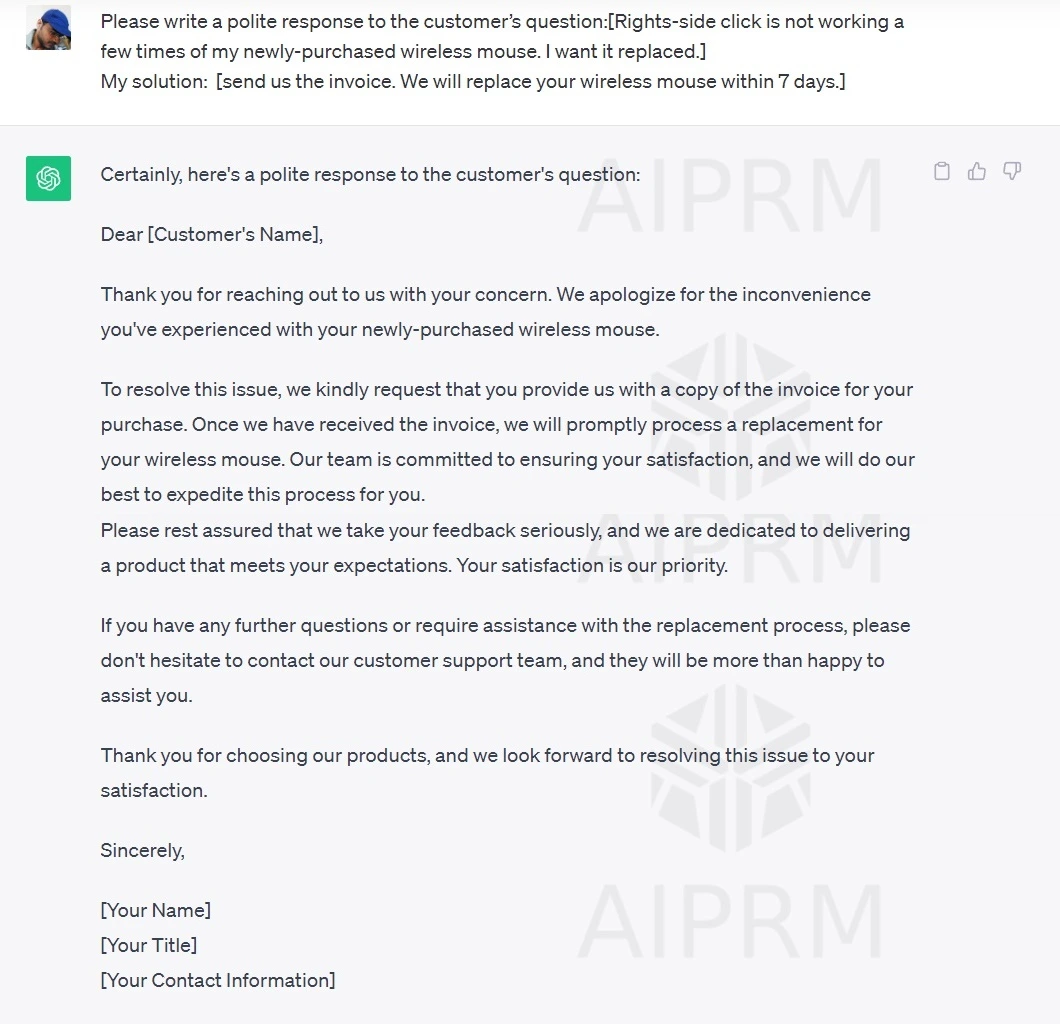
- Customers get quick resolutions to issues like order status, returns, and shipping without waiting to speak to an agent. This improves satisfaction.
- Around-the-clock availability improves service efficiency and reduces operational costs.
Providing 24/7 instant answers to customer queries
ChatGPT allows e-commerce businesses to instantly resolve all types of common customer queries at any time of day. Specifically:
- Chatbots can be programmed with company and product knowledge so they can promptly answer questions related to orders, shipping, product features, availability, etc.
- Customers receive fast, accurate responses instead of waiting on hold or exchanging multiple emails.
- Quick answers improve the overall shopping experience and satisfaction.
Personalizing conversations and product recommendations
With its natural language capabilities, ChatGPT can make conversations feel personalized and relevant for each customer. For example:
- By analyzing purchase history and browsing data, ChatGPT chatbots can make tailored product suggestions and hold contextual conversations.
- Personalized promotions and customized content/recommendations make customers feel valued.
- ChatGPT helps recreate the personalized attention of in-store assistance.
Generating appealing marketing copy and product descriptions
ChatGPT’s language generation skills can automate and enhance product page content and other marketing assets. Specifically:
- ChatGPT can instantly generate SEO-friendly product descriptions, email campaigns, landing pages, etc.
- ChatGPT can create engaging social media campaigns for your business.
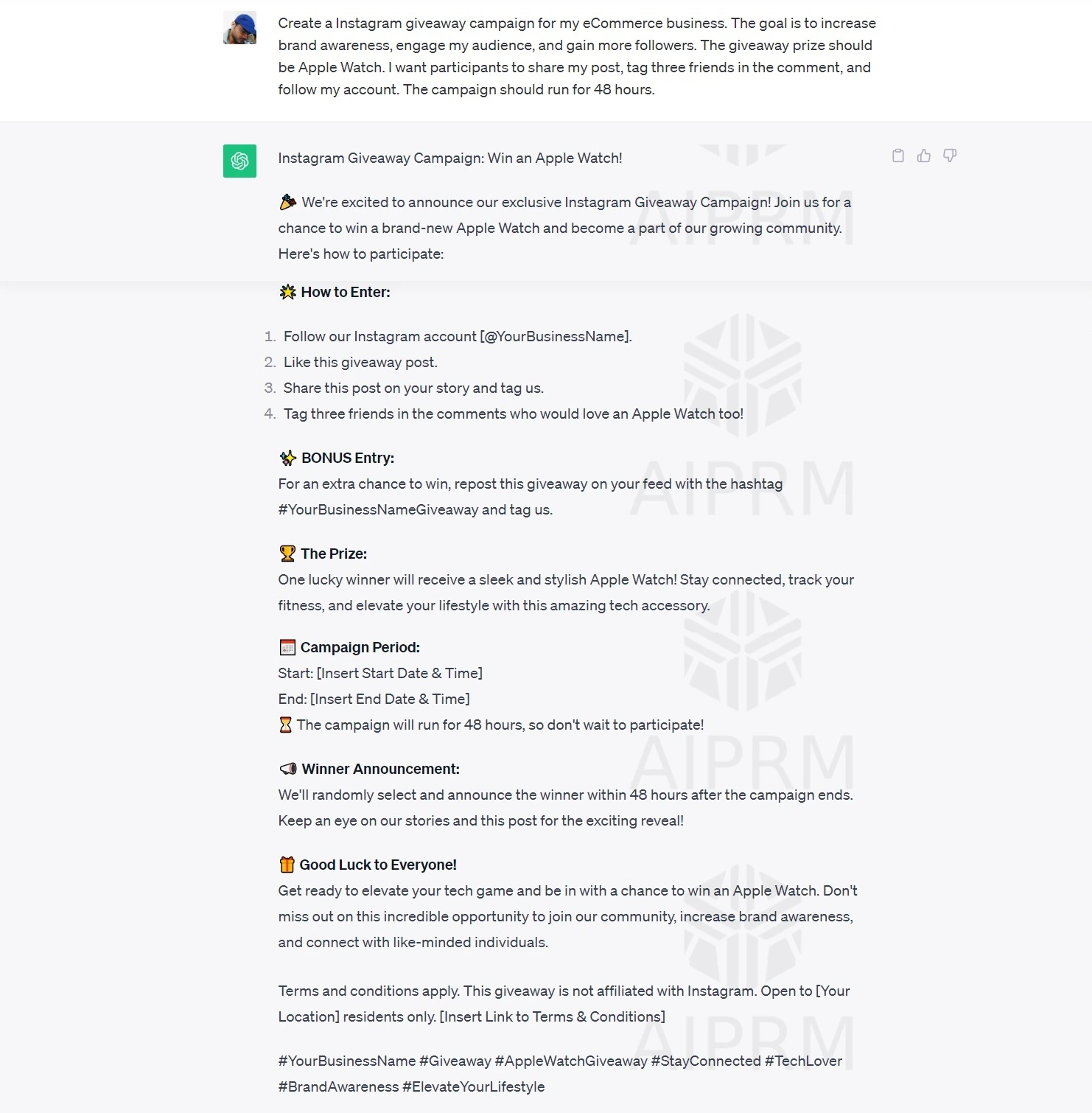
- This saves substantial time and resources spent on manual marketing content creation.
- Dynamic, optimized copy tailored to customers can boost engagement and conversions.
In summary, by automating key customer service and marketing functions through AI, ChatGPT enables e-commerce businesses to provide 24/7 support, personalized recommendations, and optimized copy. This transforms traditional shopping interactions for the better and drives higher customer satisfaction.
Optimizing Search and Discovery with AI:
Harnessing AI tools like ChatGPT also presents a major opportunity for e-commerce businesses to optimize on-site search and improve product discoverability. With its natural language processing capabilities and data analysis skills, ChatGPT can help elevate the search experience to drive more conversions. Specifically, merchants can implement conversational AI to automatically improve SEO, generate high-quality product descriptions, provide relevant recommendations, and map keywords to products. Optimizing search and discovery is critical for boosting traffic, engagement, and sales.
Applying ChatGPT for SEO optimizations
ChatGPT can analyze website content, structure, and performance to provide AI-driven solutions to improve SEO. Specifically:
- It can identify issues like thin content, over-optimization, technical problems, etc, and suggest fixes.
- The AI can rewrite existing pages to optimize them for chosen keywords and higher rankings.
- ChatGPT can also generate new SEO-focused content to fill gaps.
- Ongoing optimizations boost organic traffic and revenues.
Generating meta descriptions, tags, and titles
Based on keyword research, ChatGPT can automatically create SEO-optimized page titles, meta descriptions, header tags, and image alt text. For example:
- Meta descriptions that compellingly describe the page and use target keywords to attract search clicks.
- Titles that include primary keywords but avoid over-optimization.
- Header tags that properly emphasize important keywords.
This makes pages more visible and discoverable in search engine results.
Creating unique product listing content
ChatGPT can generate in-depth, unique product descriptions and specifications optimized to boost conversions.
- Detailed descriptions highlighting key features and differentiators in a compelling, customer-centric way.
- Dynamic generation of key product specs, details, and complementary information.
- Customized descriptions for each product variant like size, color, etc.
This provides shoppers the information they need while optimizing pages for search visibility.
Automating keyword research and mapping
With ChatGPT, e-tailers can eliminate manual keyword research by leveraging the AI to:
- Instantly analyze market and competitor data to find high-value keyword opportunities.
- Map the best keywords to products to maximize relevance for customers.
- Ensure keyword density and placement in content are optimized.
- Refresh keyword selections to adapt to changing search trends.
This ensures products can be easily discovered by customers searching relevant terms.
By leveraging ChatGPT to optimize SEO elements, generate high-quality product content, and automate keyword research, e-commerce businesses can significantly elevate their findability and drive more qualified traffic to their online stores. Implementing these AI functionalities is key for boosting conversions in an increasingly competitive market.
Boosting Sales Through AI-Generated Content:
ChatGPT’s advanced natural language generation capabilities make it an invaluable asset for automating and enhancing e-commerce content to drive more sales. By leveraging AI to produce optimized, dynamic copy for elements like email campaigns, landing pages, and product descriptions, online retailers can create highly effective content that engages customers and compels them to purchase. Implementing ChatGPT to boost conversion-focused copy at scale is a powerful way to grow revenues.
Crafting data-driven email campaigns and newsletters
Email marketing remains one of the highest ROI channels for driving e-commerce sales. As an eCommerce business, effective email marketing is essential to:
- Launch new products
- Run sales and promotions
- Retain customers
- Recover abandoned carts
- Gather customer feedback
With its natural language capabilities, ChatGPT enables any eCommerce merchant to easily create optimized, customized emails at scale for any marketing need. Automating copywriting with AI saves time while boosting engagement and conversions.
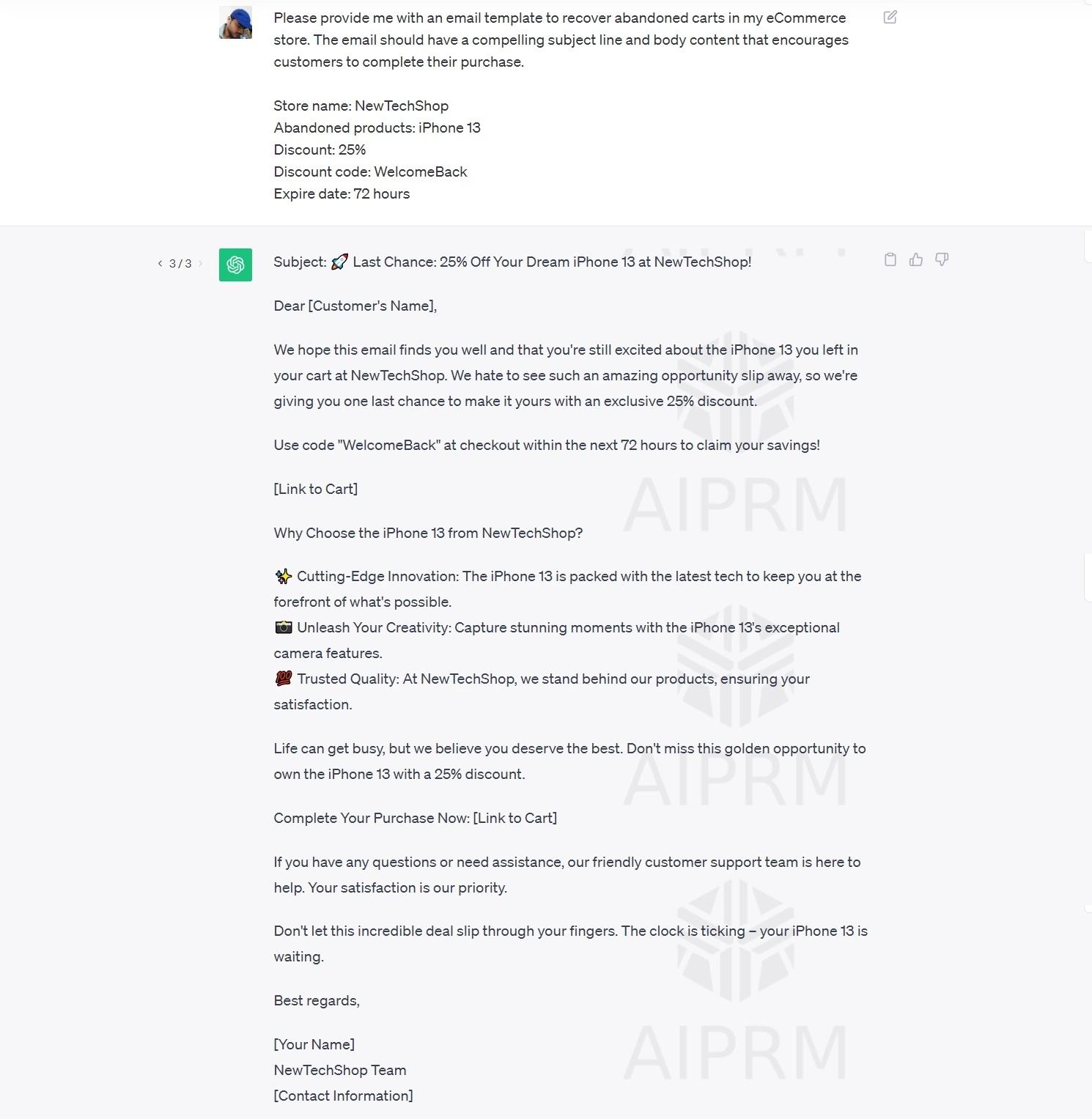
ChatGPT can maximize email performance by using customer data to deeply personalize messaging and promotions within campaigns and newsletters. Specifically, the AI can:
- Analyze purchase history, browsing behavior, and demographics to segment subscribers and personalize content.
- Create dynamic subject lines using customer names and targeted promotions they would like.
- Generate content customized to subscriber personas – relevant recommendations, personalized copy, etc.
- Continually test and refine email content and timing to maximize engagement and conversions.
This data-driven approach results in emails that feel customized and speak directly to the recipient, driving more sales.
Producing targeted landing pages and web copy
Optimized landing pages are critical for converting website visitors into customers. ChatGPT can generate high-converting copy for targeted landing pages including product pages, promotions, and more. Drawing on buyer personas and keyword research, the AI can create pages with:
- Engaging headline and copy on hero banners tailored to customer segments.
- Detailed product descriptions, testimonials and copy catering to visitor intent.
- Clear calls-to-action for desired conversions like subscriptions, downloads, purchases, etc.
- Layouts, visuals, and content formatted for easy consumption.
ChatGPT landing page copy compels visitors to convert at higher rates.
Creating detailed product titles, descriptions, and specs
High-quality product page copy is essential for educating customers, building trust, and driving conversions. ChatGPT can automatically generate compelling product descriptions and specs tailored to each product. By leveraging AI, e-commerce brands can create product copy that highlights differentiators, provides relevant details, and motivates purchases such as:
- Detailed and compelling product titles for better search optimization
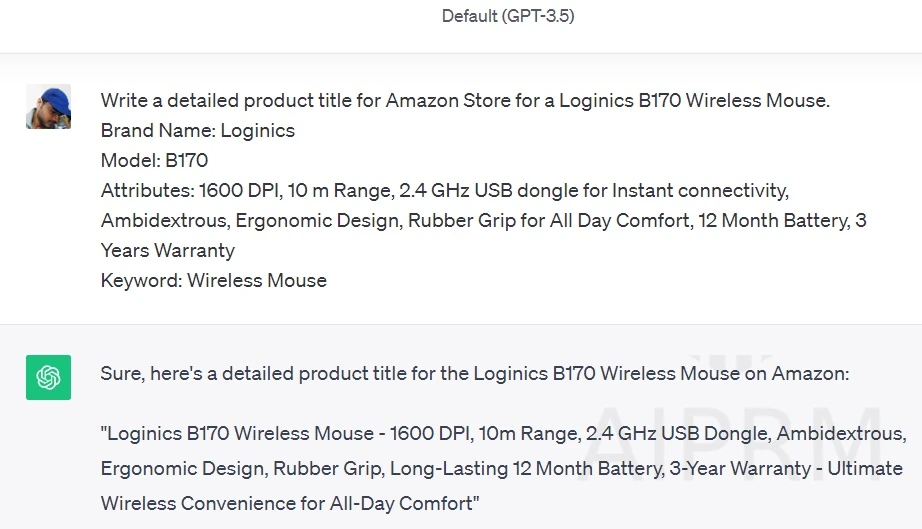
- Descriptions highlighting the most compelling and differentiated features of the product.
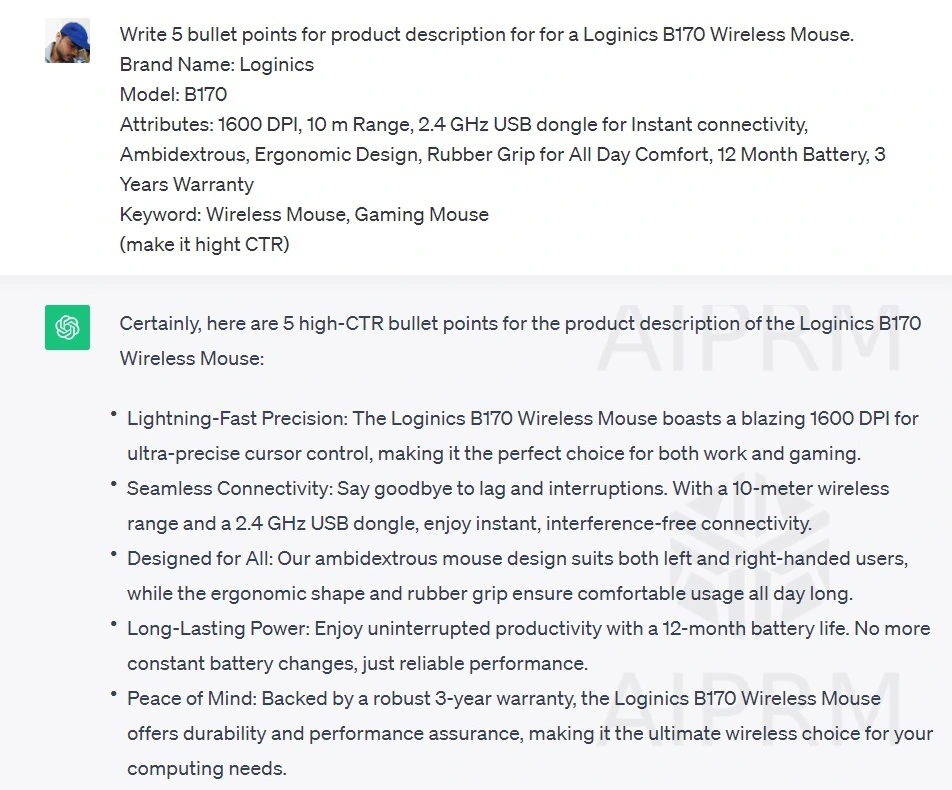
- Specific details like available colors, sizes, configurations, standards. etc.
- Complementary information on materials used, manufacturing details, certifications, and safety testing.
- Comparisons with competitor products, alternative options, and key decision factors for customers.
This in-depth copy builds trust in the product and nudges customers to add it to their cart.
Automating cross-selling and upselling recommendations
Intelligent cross-selling and upselling are key to increasing order values. ChatGPT can generate personalized recommendations for complementary or higher-tier products. By analyzing customer data, the AI can provide recommendations that are tailored to each user and compellingly explain why an additional purchase is valuable, such as:
- Analyzing past purchases and browsing history to suggest complementary or higher-end products.
- Explaining precisely why the additional product would be valuable for the customer.
- Using compelling messaging tailored to the customer’s needs and interests.
- Making recommendations contextually at key touchpoints like cart, checkout, and account pages.
The data-driven, personalized recommendations turn more visitors into buyers and higher-value customers. By leveraging ChatGPT to optimize high-converting copy at scale, e-commerce businesses can boost engagement and sales through compelling email campaigns, landing pages, product descriptions, and recommendations.
Analyzing Data and Trends with ChatGPT:
ChatGPT also presents game-changing opportunities for e-commerce businesses to leverage AI for advanced data analytics and business intelligence. With its ability to process volumes of data, identify patterns, and generate insights, ChatGPT can help online retailers make data-driven decisions across key functions like inventory planning, logistics, marketing optimization, and more. Specifically, merchants can use ChatGPT to analyze sales data, predict trends, create reports, and translate insights into concrete strategies to boost KPIs.
Using AI to analyze sales data and identify opportunities
With the ability to process large volumes of sales and customer data, ChatGPT can surface valuable insights that optimize marketing, merchandising, and product strategy. Specifically, the AI can identify trends, segments, and patterns that reveal high-potential opportunities to increase revenue. ChatGPT can process large volumes of historical sales data to uncover trends and patterns that provide actionable insights, such as:
- Identifying customer segments with the highest purchase frequency/AOV to focus marketing efforts.
- Analyzing product performance to double down on top sellers and remove slow-moving items.
- Flagging trends around seasonality, promotions, and events to optimize future plans.
- Comparing channel and geography performance to inform sales expansion.
These data-driven insights help significantly optimize marketing, merchandising, and product strategies.
Generating reports and dashboards to inform strategy
ChatGPT enables easy tracking of all key e-commerce metrics by automatically generating intuitive reports and dashboards from raw data. Management can efficiently monitor KPIs, trends and make data-driven decisions. ChatGPT can synthesize raw data into easy-to-understand reports and dashboards to provide key insights, including:
- Automated reporting of KPIs like revenue, website traffic, conversions, LTV, churn, etc.
- Visualization of trends over time through charts and graphs.
- Segmenting data by relevant dimensions like product, geography, channel, etc.
- Exporting interactive dashboards and reports to aid data-driven decision making.
This enables management to easily track all key metrics and react faster.
Predicting customer behavior and product demand
Powerful predictive capabilities allow ChatGPT to forecast future customer response, purchasing behavior, and product demand with high accuracy. These AI-generated predictions optimize planning and inventory management. Leveraging historical data, ChatGPT models can accurately predict:
- Customer response to marketing campaigns and likelihood to purchase.
- Churn risk based on engagement and purchasing patterns.
- Product/category demand based on previous performance, seasonality, and other factors.
Better forecasts optimize planning and inventory for efficiency and waste reduction.
Providing insights for inventory and supply chain management
By correlating sales data with external drivers, ChatGPT provides supply chain insights to optimize inventory levels, logistics, and waste reduction. The AI identifies the optimal stock to maintain for each product based on demand signals.
- ChatGPT can correlate sales with external drivers like seasons, marketing campaigns, pricing changes, etc.
- This powers better supply chain planning, forecasting, logistics, and inventory management.
- The AI identifies the optimal inventory levels to maintain for each product to meet demand.
- Waste is reduced while avoiding stock-outs.
With its powerful data processing and analytical capabilities, ChatGPT enables e-commerce businesses to derive key insights from sales, inventory, and customer data. This allows online retailers to make smarter, optimized decisions to boost KPIs across all areas of their operations.
Integrating ChatGPT within eCommerce Platforms:
To fully realize the benefits of conversational AI, e-commerce businesses need to properly integrate ChatGPT within their technology stack. While ChatGPT is accessible through its API, merchants must connect it with ecommerce platforms like Shopify, Magento, and custom systems. This involves strategies like developing specialized chatbot interfaces, integrating AI functions into the backend, and embedding capabilities on the front-end. With thoughtful integration, retailers can seamlessly leverage ChatGPT to elevate customer experiences and optimize operations across platforms.
API integration to connect ChatGPT with ecommerce backends
ChatGPT offers API access for seamless integration with various ecommerce backends, allowing developers to create connectors that synchronize and access customer data from different ecommerce platforms. This integration empowers businesses to harness the capabilities of ChatGPT while ensuring the security of their valuable customer information.
Implementation guides for platforms like Shopify, Magento, WooCommerce
For popular ecommerce platforms such as Shopify, Magento, and WooCommerce, comprehensive implementation guides are readily available. These guides provide step-by-step instructions for seamlessly integrating ChatGPT into these platforms. They cover aspects such as installation, configuration, and optimizing the AI’s capabilities, making it easier for merchants to leverage ChatGPT’s potential without significant technical hurdles.
Front-end integration to embed conversational UI
Moreover, businesses can take advantage of front-end integration to embed ChatGPT’s conversational interface directly into their ecommerce websites. This integration enables shoppers to engage with an AI assistant, allowing them to seek product recommendations, obtain customer support, and more. By incorporating this conversational UI, ecommerce sites enhance the overall customer experience and engagement on the front-end, ultimately leading to improved customer satisfaction and increased sales.
The Future of AI in E-Commerce
As the digital landscape continues to evolve, the role of AI in the e-commerce industry is poised for substantial growth and transformation. The integration of advanced AI technologies, like ChatGPT, offers e-commerce businesses a promising path to optimize sales, enhance customer experiences, and stay competitive in a rapidly changing market.
Emerging Innovations and Applications of Generative AI
One of the key elements shaping the future of AI in e-commerce is the emergence of generative AI technologies. These innovations, like ChatGPT, enable e-commerce businesses to create dynamic and personalized interactions with customers. They can offer real-time product recommendations, answer customer queries, and even assist in content creation. As AI continues to advance, we can expect even more sophisticated applications that empower businesses to tailor their offerings to individual customer preferences, significantly boosting sales and customer satisfaction.
The Evolution of Virtual Assistants and Conversational Commerce
Virtual assistants are becoming increasingly integral to the e-commerce landscape. Integrating AI chatbots, like ChatGPT, into online stores allows businesses to provide instant support, engage with customers on a personal level, and guide them through the purchasing process. The future of e-commerce is likely to see virtual assistants evolving into even more intelligent and conversational agents. They will not only help with product recommendations but also assist in addressing complex customer concerns and delivering a seamless shopping experience.
Ethical Considerations for Responsible AI Use
With the growing influence of AI in e-commerce, it is vital to consider the ethical implications of AI integration. As AI systems like ChatGPT become more sophisticated, it is crucial to ensure that they are used responsibly and transparently. Businesses need to prioritize data privacy, fairness, and the responsible handling of customer information. This entails establishing clear guidelines and ethical standards for AI use to build and maintain trust with customers.
Preparing Your E-Commerce Business for the AI-Powered Future
To succeed in the AI-powered future of e-commerce, businesses should proactively prepare themselves for this transformative journey. This involves:
- Data Readiness: Ensure that your data infrastructure is robust and capable of handling the influx of customer data needed to fuel AI-driven recommendations and insights.
- AI Integration Strategy: Develop a clear plan for integrating AI, like ChatGPT, into your online store. This includes determining the use cases, selecting the right AI tools, and setting up a framework for continuous improvement.
- Staff Training: Invest in training your team to work effectively with AI technologies. This includes understanding how to optimize AI capabilities and maintain the ethical use of AI.
- Customer Education: Educate your customers about the benefits and limitations of AI in your e-commerce business. Transparency can help build trust and enhance the customer experience.
- Monitoring and Evaluation: Implement systems to monitor the performance of AI integrations and gather customer feedback. Regular evaluation ensures that the AI remains a valuable asset to your business.
The future of AI in e-commerce holds great promise for optimizing sales and revolutionizing customer interactions. By embracing emerging AI innovations, focusing on responsible AI use, and taking proactive steps to prepare for an AI-powered future, e-commerce businesses can position themselves at the forefront of this transformative journey, delivering exceptional experiences to their customers and driving increased sales.
Final Thoughts
As AI capabilities continue to rapidly advance, generative models like ChatGPT present transformative opportunities for eCommerce businesses to optimize operations, marketing, and the customer experience. By implementing conversational AI across key functions from customer service to data analytics, online retailers can boost engagement, conversions, and sales. Yet real results require thoughtful integration into existing platforms and workflows.
With an effective strategy, ChatGPT’s natural language prowess enables you to provide 24/7 support, generate high-converting copy, uncover data insights, and elevate personalization. The creative potential of generative AI is only just emerging. Now is the time for forward-thinking eCommerce brands to explore integrating ChatGPT and pave the way for an intelligent future of conversational commerce. By leveraging this technology as a competitive advantage, online retailers can Spearhead the next evolution of the customer journey while driving sustainable growth.
Latest posts by Vijaya Tyagi (see all)
How To Track Shopify SEO Performance & Metrics (2025) - January 14, 2025
Link Building Strategies: The Ultimate Techniques for 2025 - December 31, 2024

